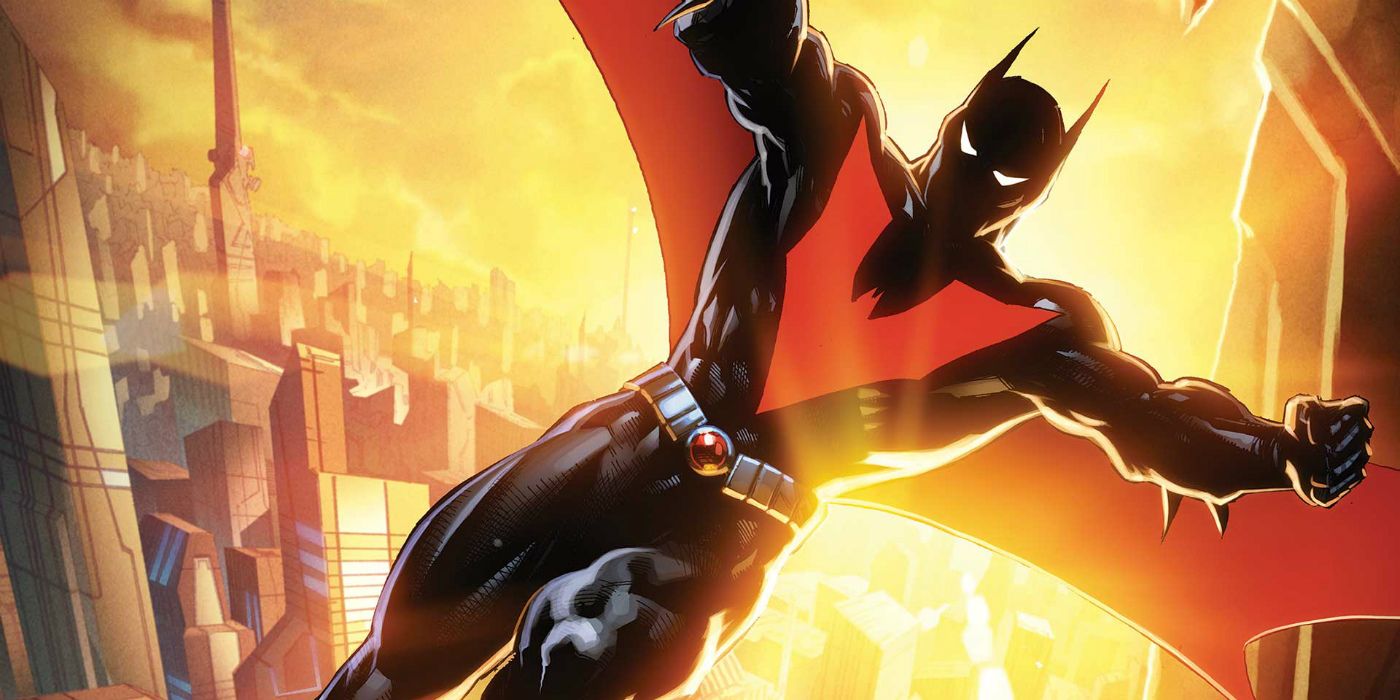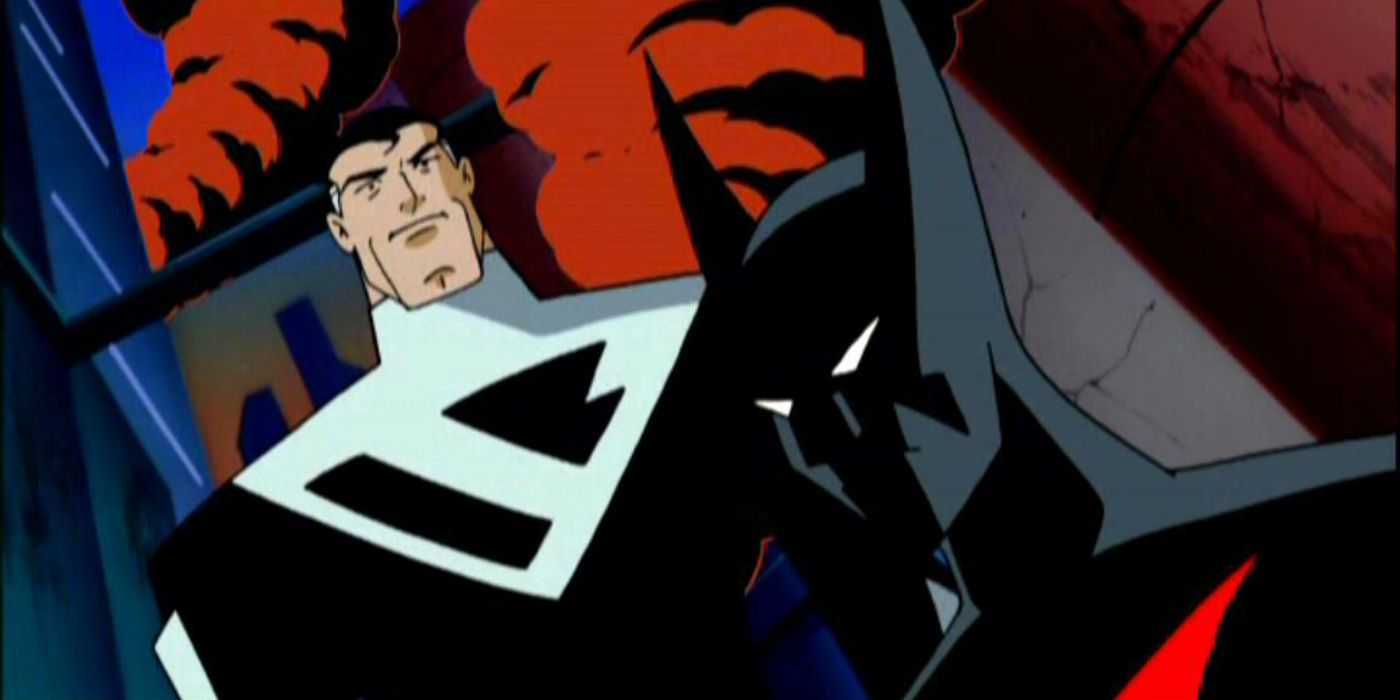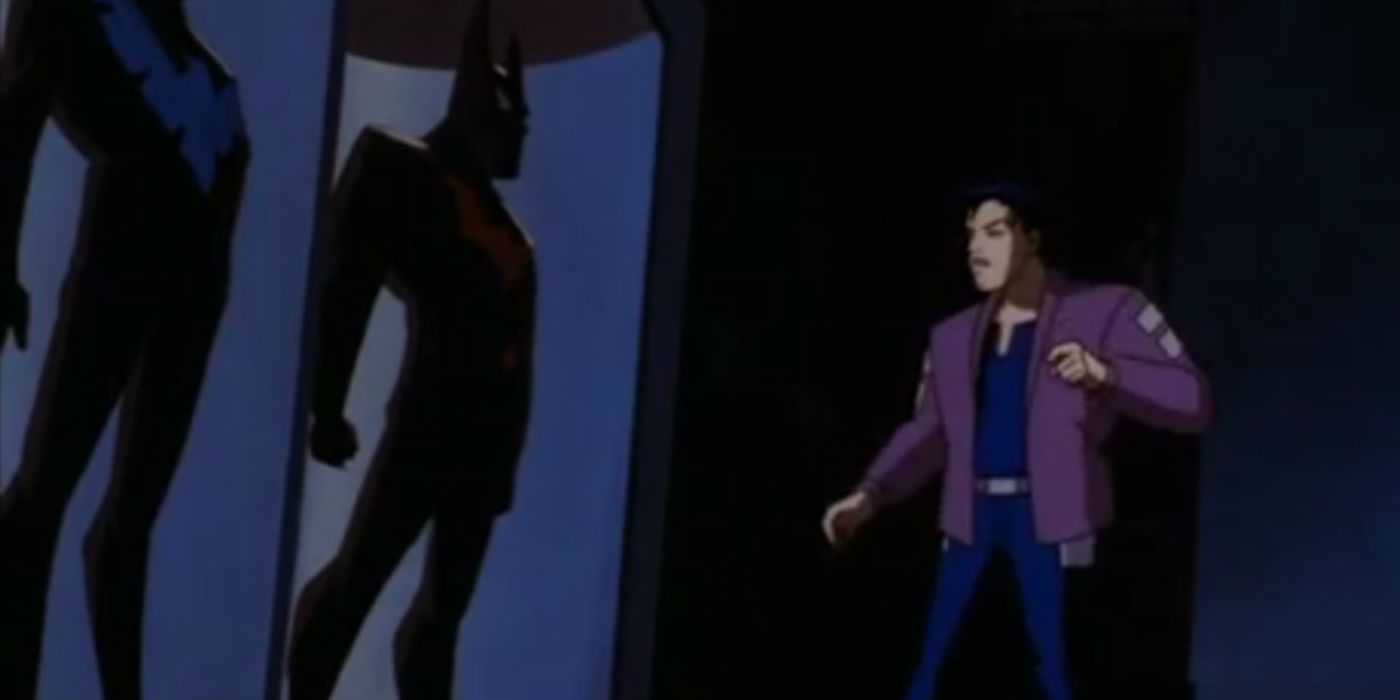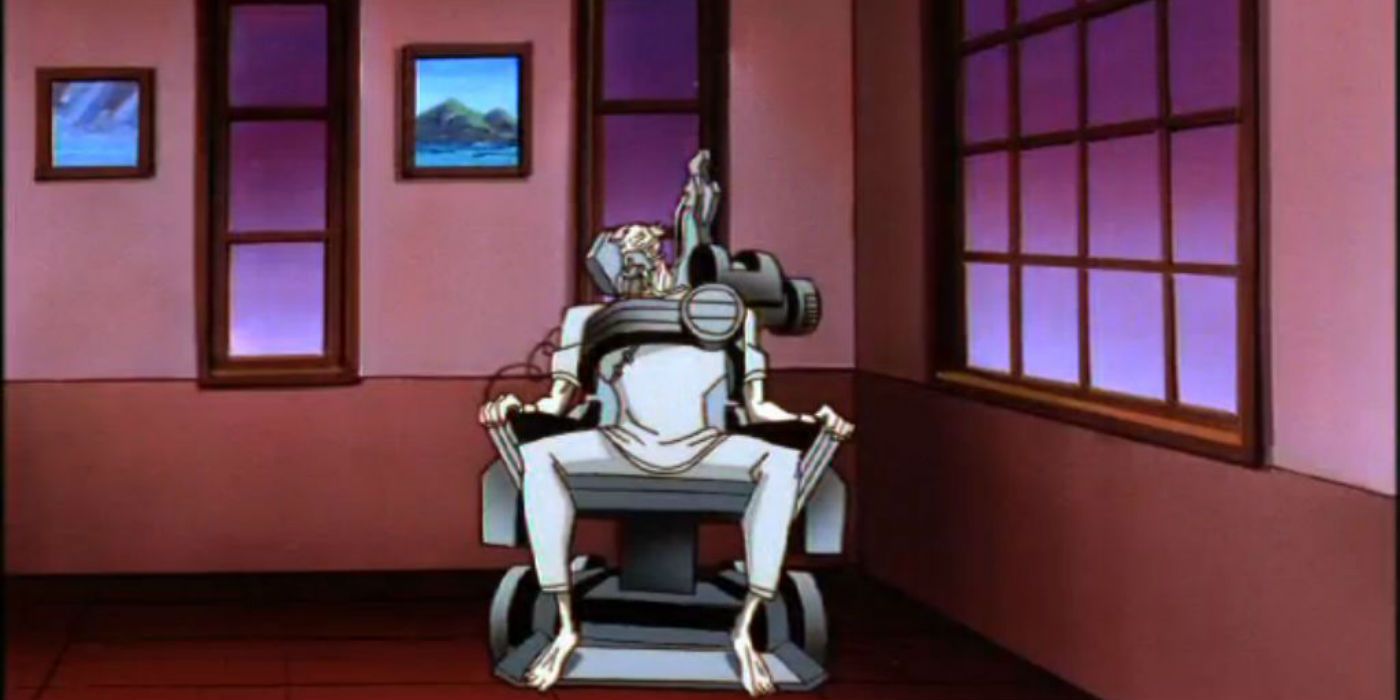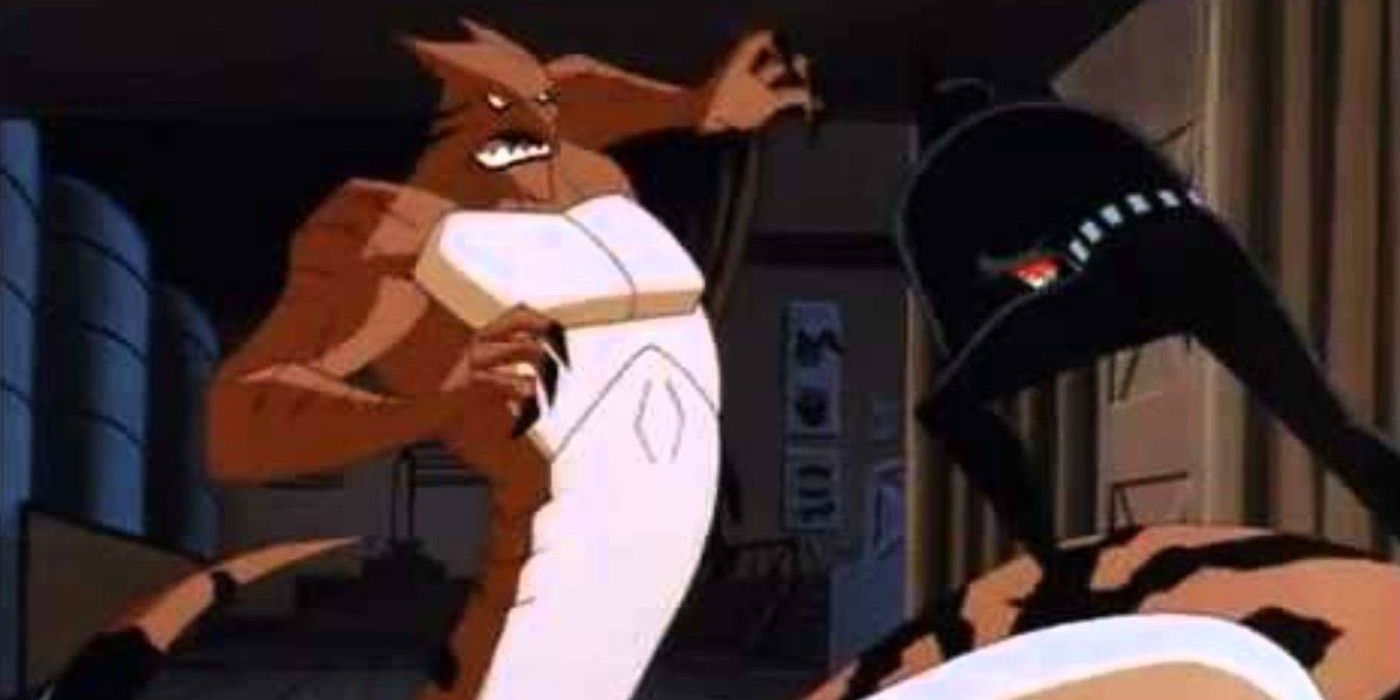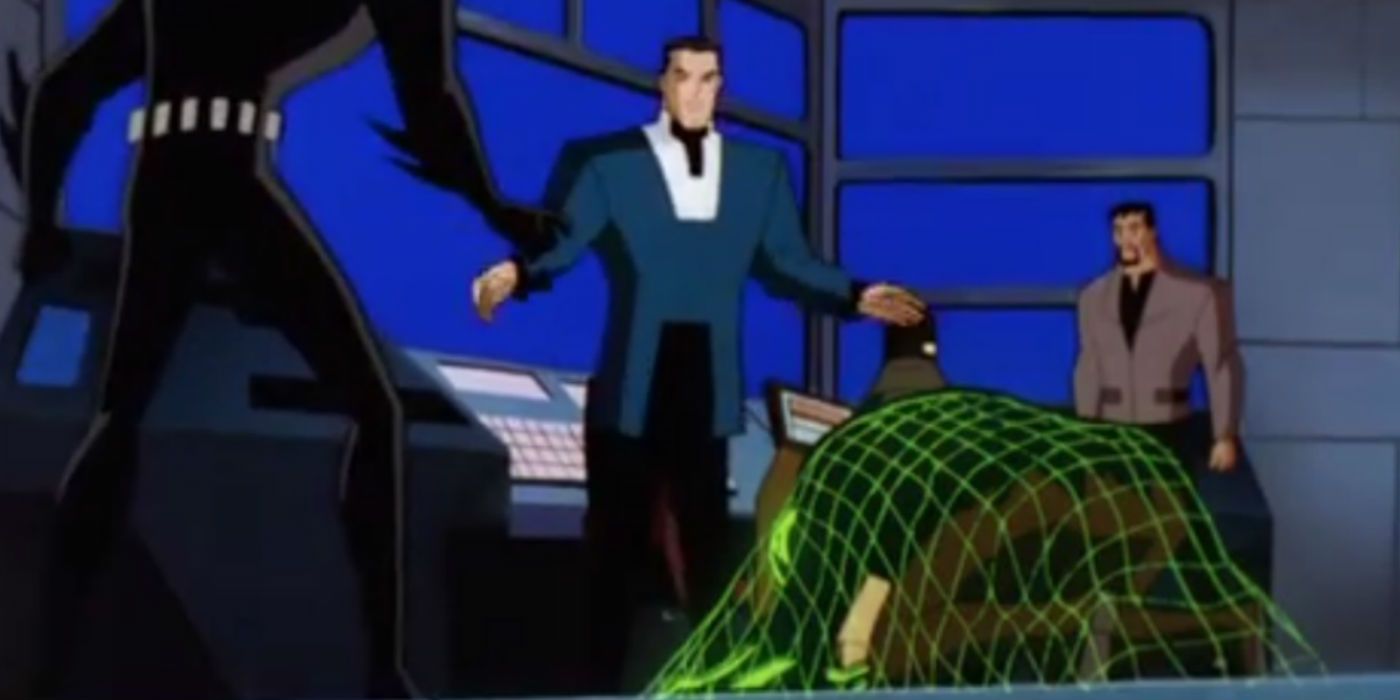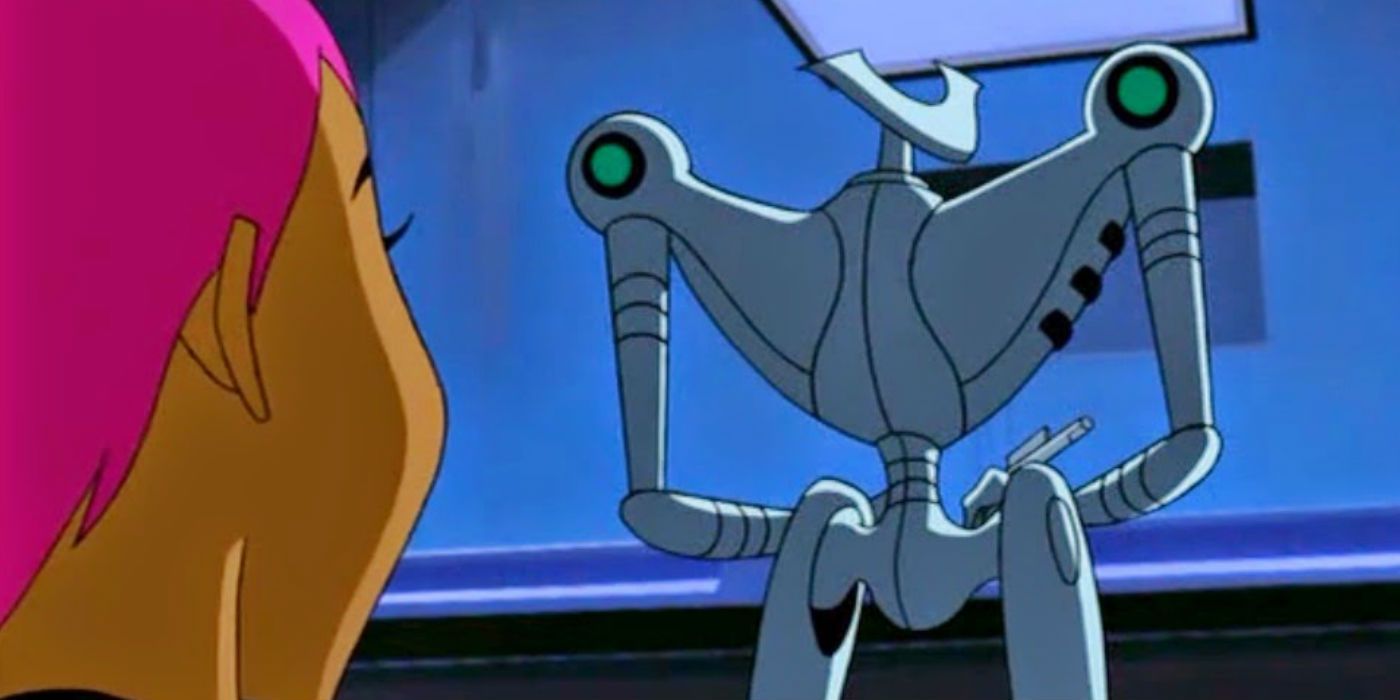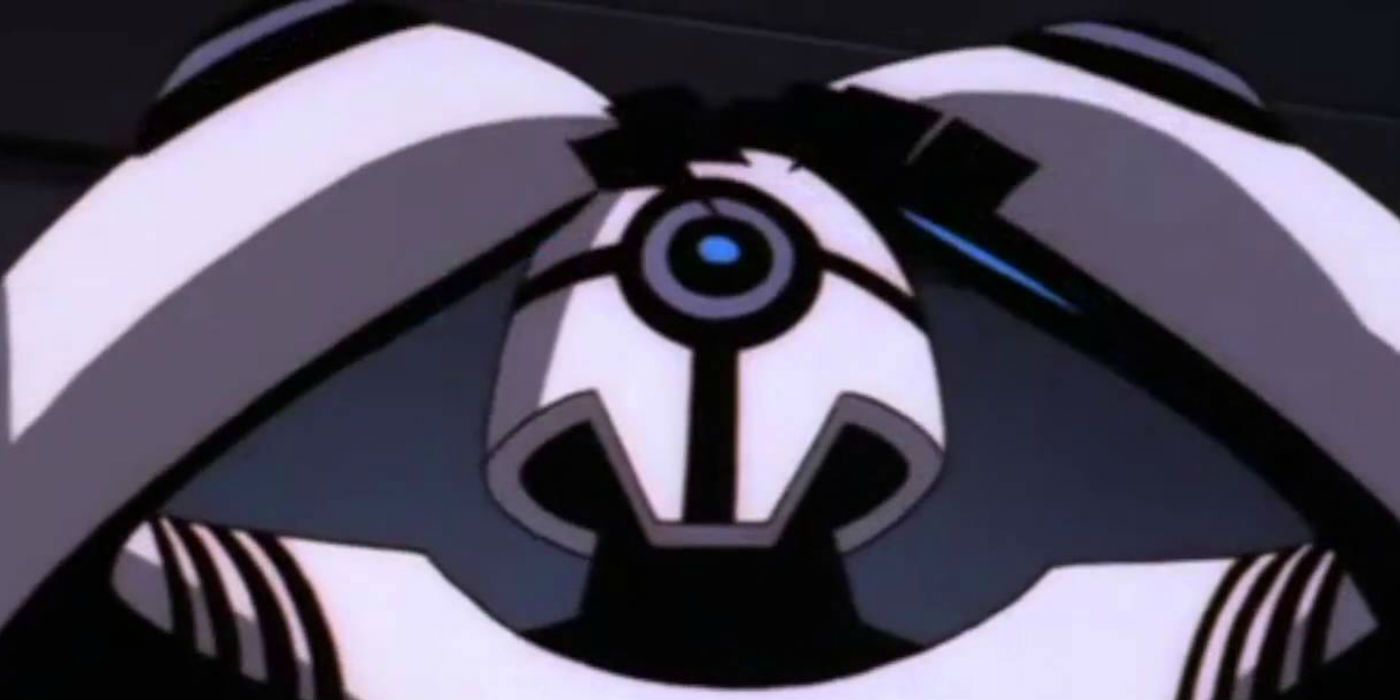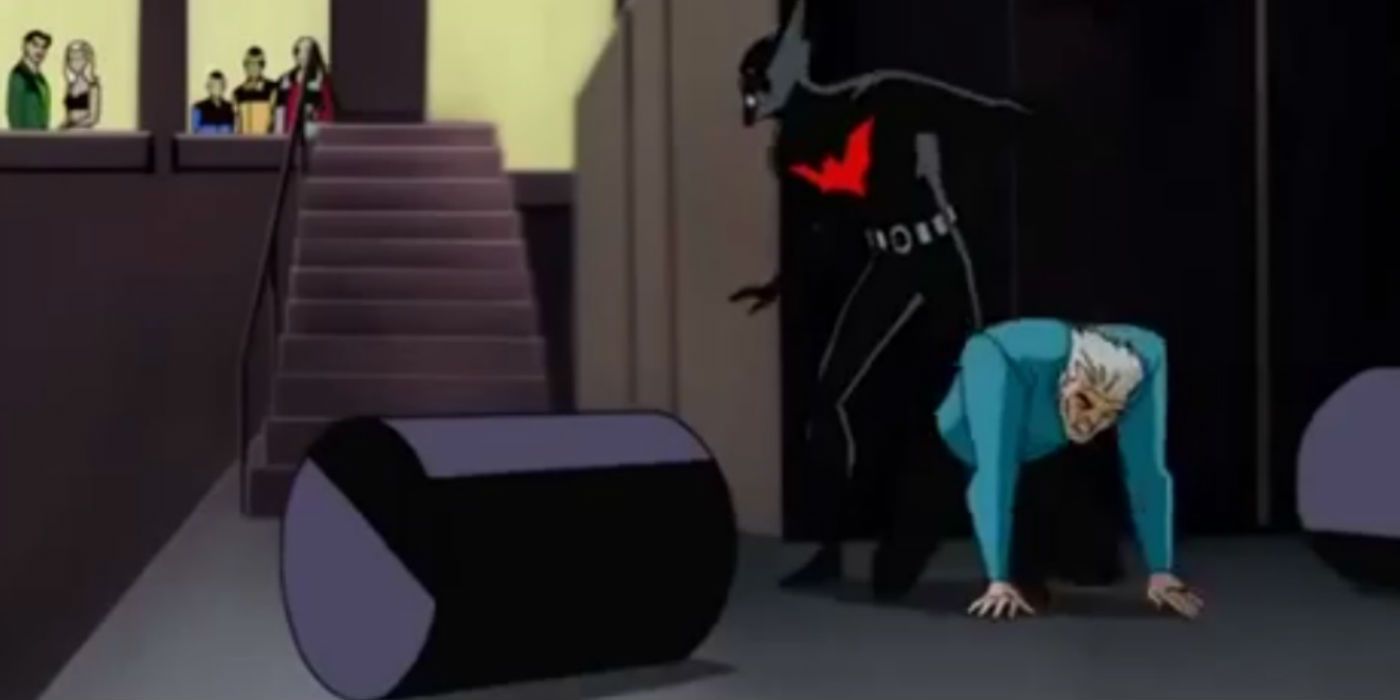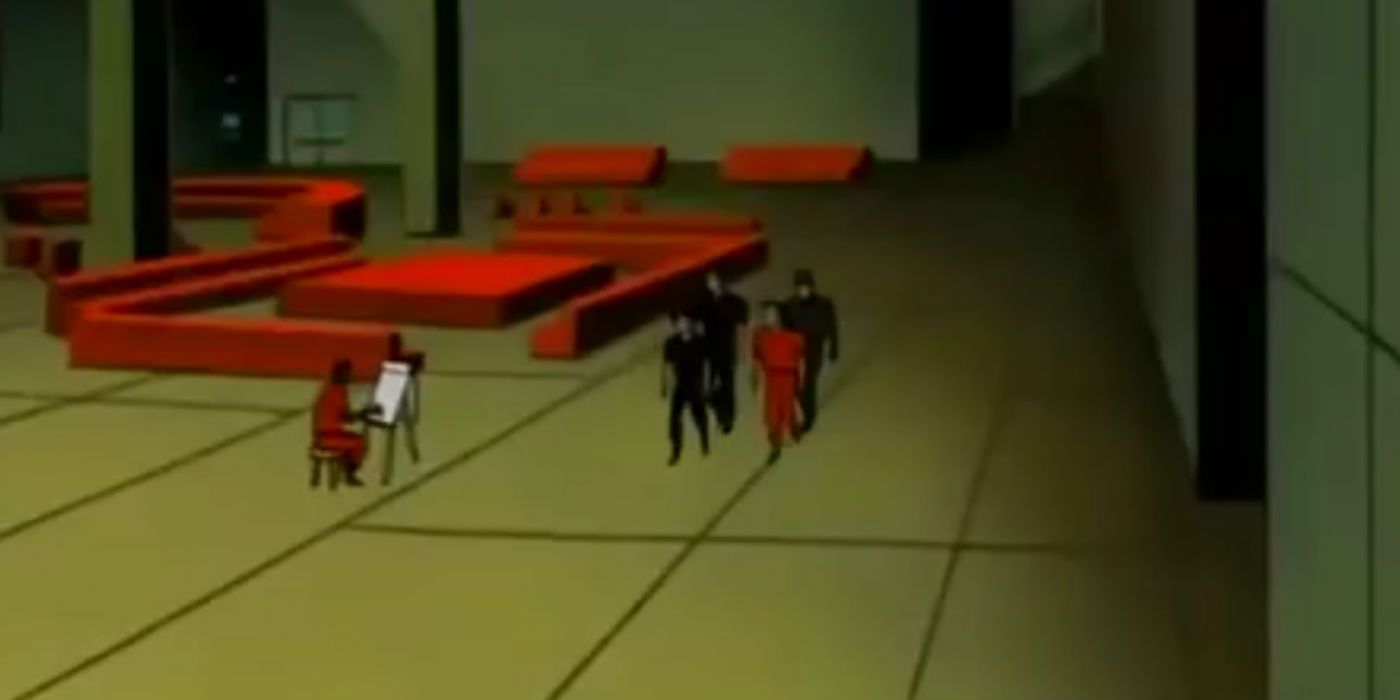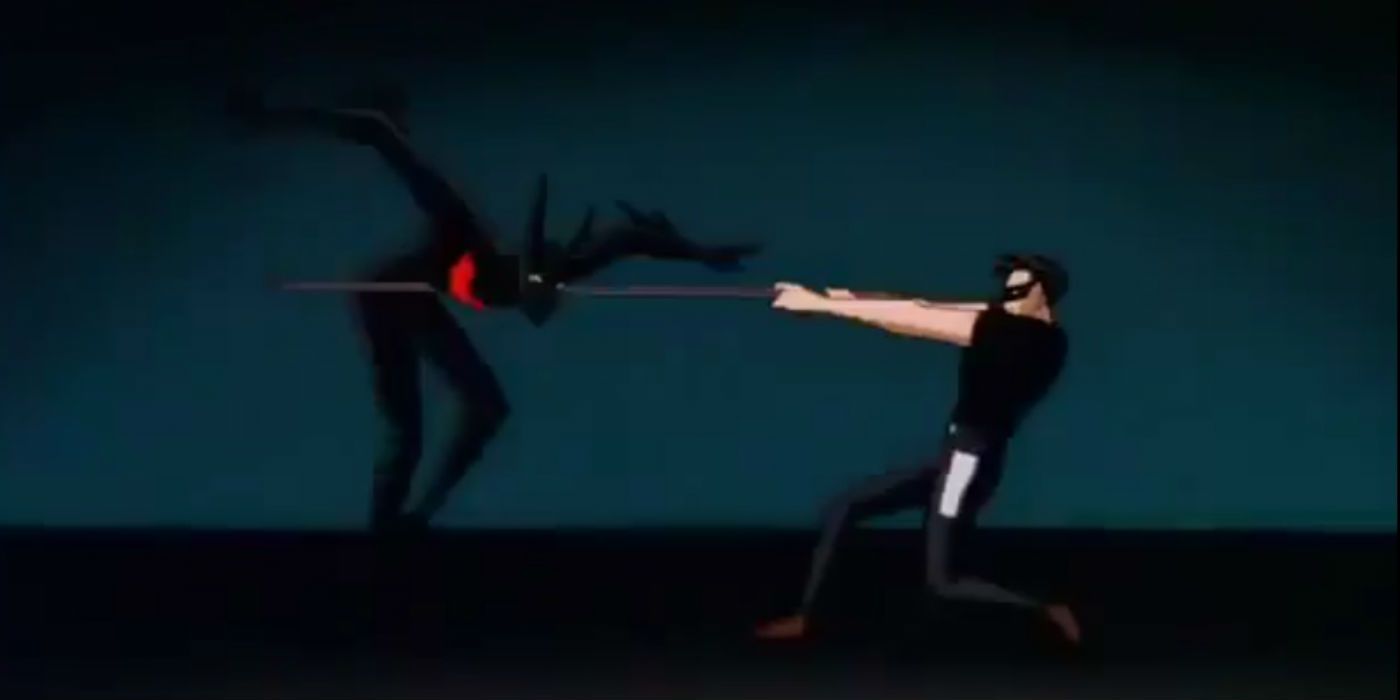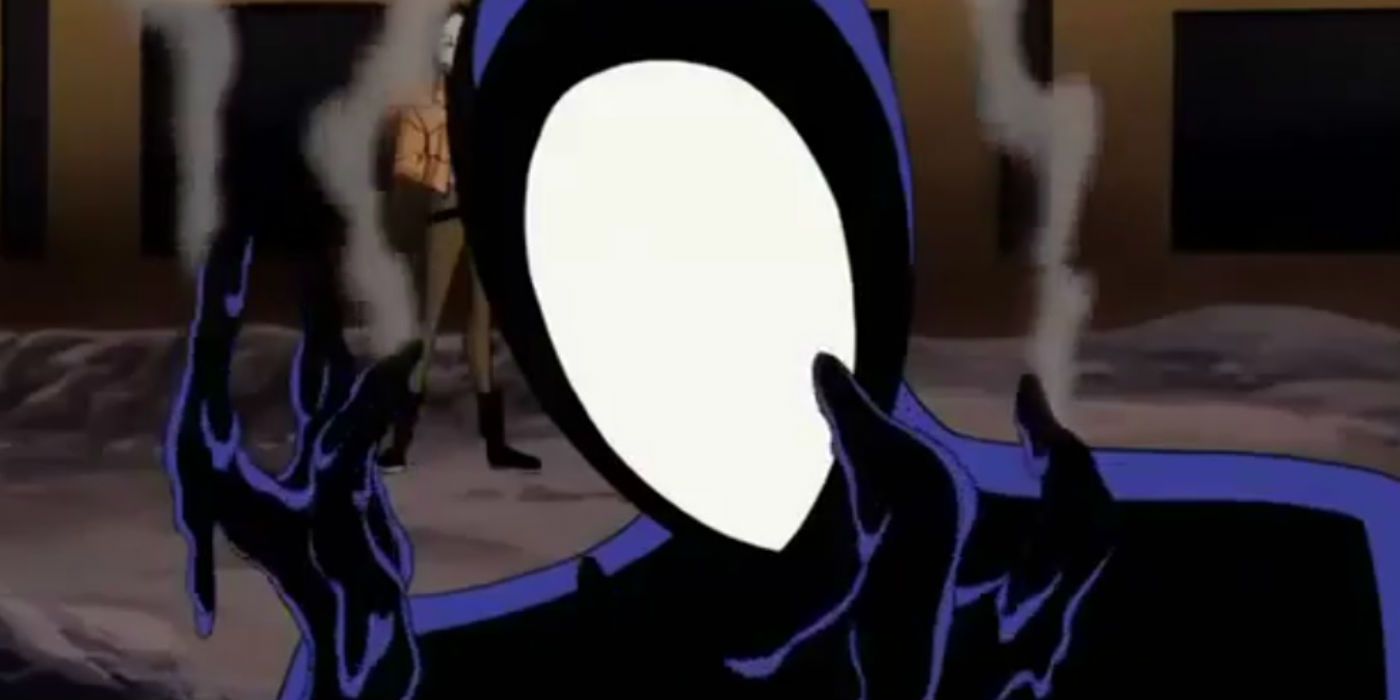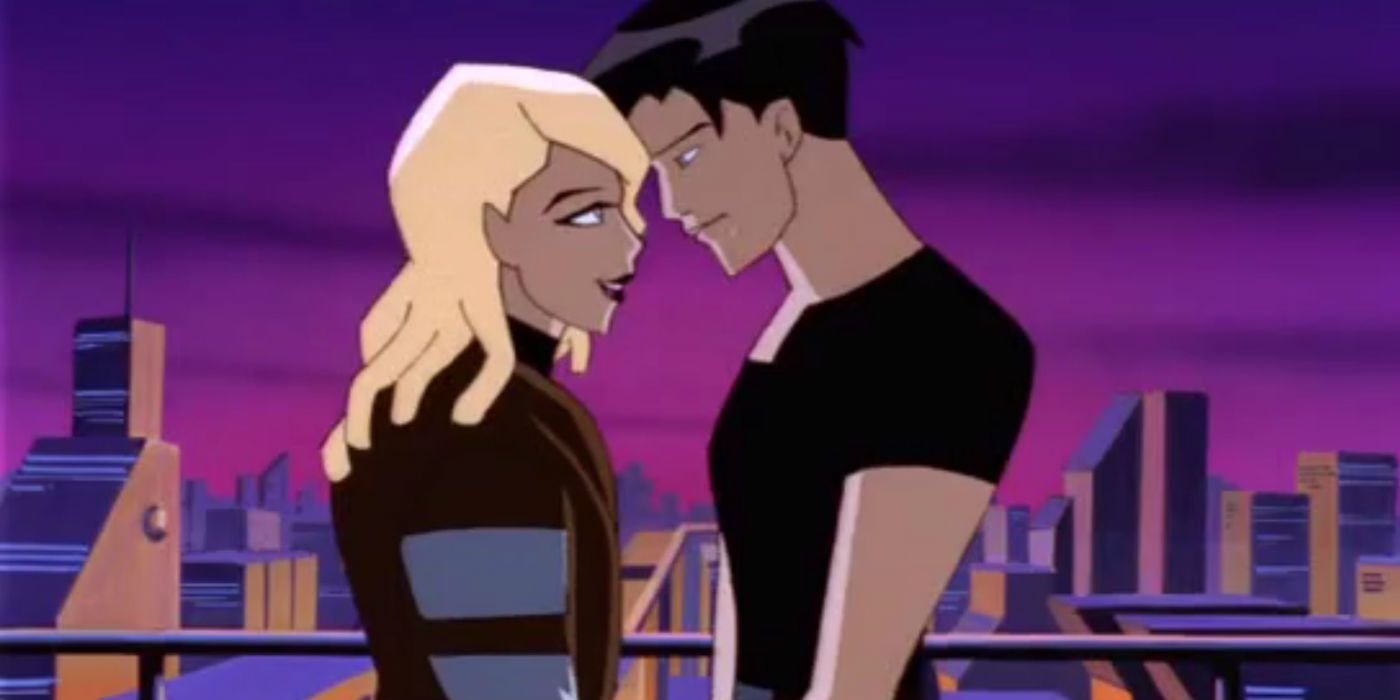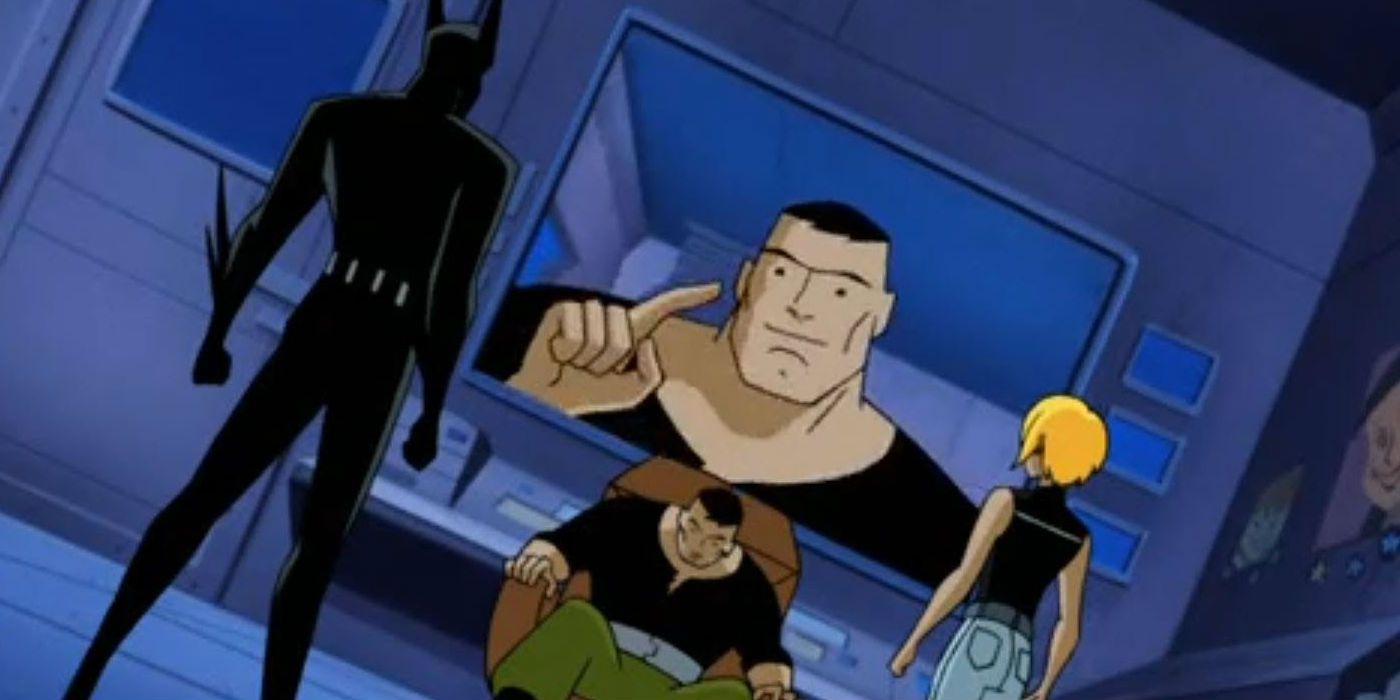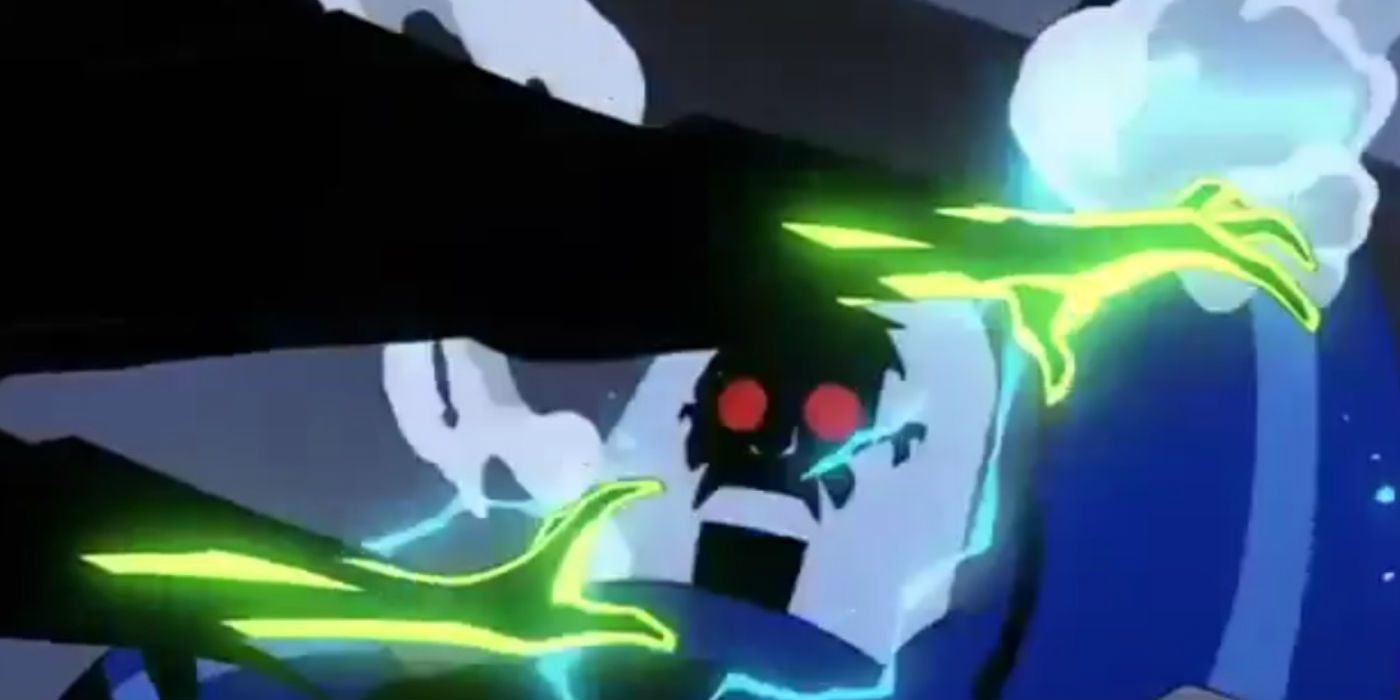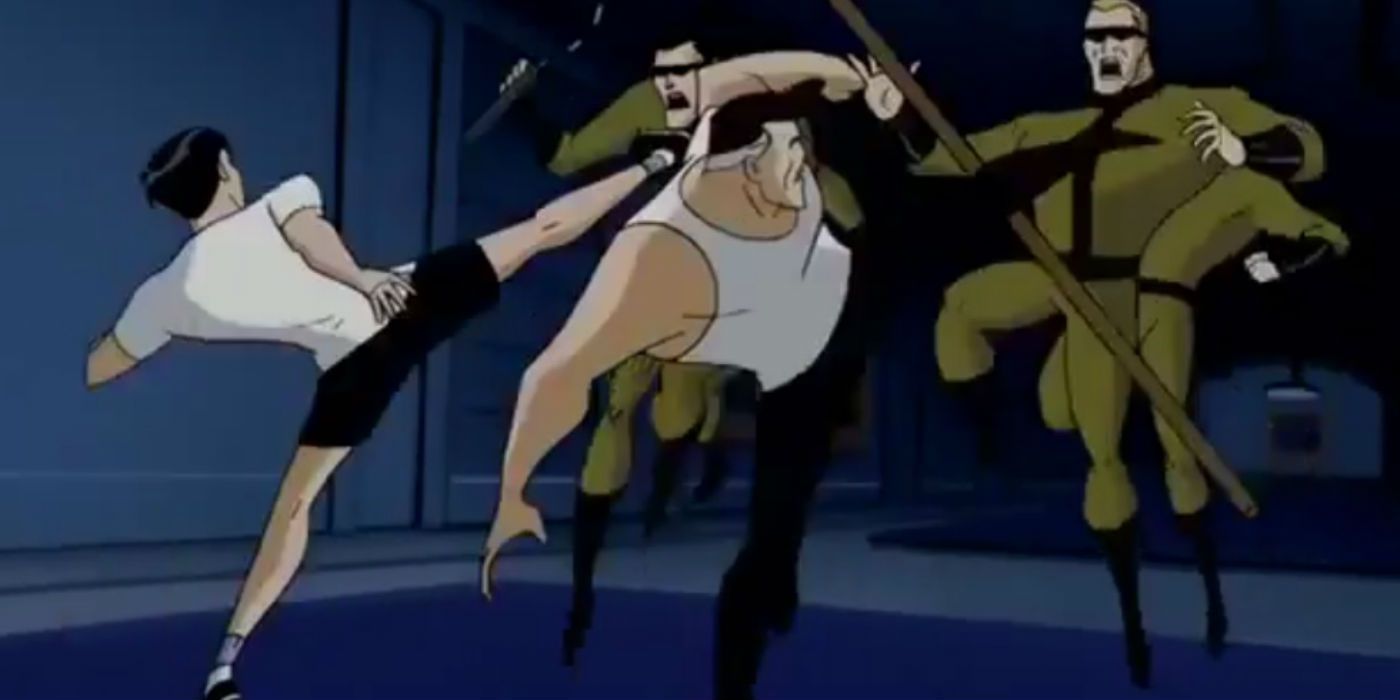"Batman Beyond" was equally as enthralling as its predecessor and had some fantastic episodes starring both an older Bruce Wayne and an energetic, witty Tomorrow Knight, who was surprisingly fitting as the Dark Knight's replacement. Of course, it makes sense that he would be, especially if you caught that fantastic "Justice League Unlimited" episode, "Epilogue" (written by Bruce Timm and Dwayne McDuffie).
RELATED: 15 Best Episodes of Batman: The Animated Series
The series, which led to a great spin-off show and a "Batman Beyond" comic series, had something to offer for both new and old fans of "Batman: The Animated Series." With its futuristic setting and new characters, "Batman Beyond" offered up brilliant and exciting new stories, the best of which we've listed for you here. These are the schway-est of the schway in the series, the episodes which showcased the best of Terry McGuinness, Bruce Wayne and both the corruption and virtues of the Gotham City of 2039.
15 THE CALL (PARTS 1 & 2)
First up is the epic two-part episode, "The Call," in which Batman meets an older Superman while chasing the supervillain, Inque. After proving he's still the same powerful Kryptonian he was 30 years ago, Superman invites Terry to join the new Justice League, comprised of himself, Big Barda, Aquagirl, Warhawk, Kai-Ro (a Green Lantern) and Micron. None of them are particularly accepting of the new Batman at first but, after aiding them and ultimately saving them all as only a Batman can, he's welcomed into the League. At this point, however, after seeing first-hand how disjointed the League really is, Terry decides against becoming a member.
There are many reasons why this one is so great. Up until this episode, we'd only seen Terry face relatively simple adversaries. "The Call" (written by Paul Dini and Alan Burnett) pits him against members of the Justice League (controlled by Starro) and gives him a real chance to shine as a Batman on par with his predecessor, in both fighting and detective skills. It's also awesome because of that foreshadowing comment Superman makes when Terry notes that he and his predecessor have something in common. "More than you know" he says.
14 REBIRTH (PARTS 1 & 2)
Of course we have to mention Terry McGinnis' tragic origin story, as shown in the series' two-part premiere episode, "Rebirth" (written by Paul Dini, Alan Burnett and Stan Berkowitz). It shows us first what happened to Bruce Wayne. We knew it would happen at some point, but how his career as the Dark Knight ended was tragic. Still, it elegantly gave us closure and paved the way for a new Batman. Terry McGinnis starts off as a misunderstood young man in need of direction. While fleeing a gang of Jokerz (thugs crazy enough to try emulate the Clown Prince of Crime), Terry meets Bruce Wayne and discovers his secret.
Though not exactly the same, there are clear parallels between Terry and Bruce Wayne's origin stories. It's the loss of a loved one that drives them and they're both stubborn, that much is clear. It's great to see how their relationship starts off. Despite having taken on a lot of apprentices in the past, Bruce isn't exactly willing to aid Terry at first, which gives the youngster a chance to show us how much of a fighter he is. He's after justice (or vengeance) and he'll stop at nothing to get it.
13 THE WINNING EDGE
The original "Batman" cartoon series wasn't afraid to tackle deep and relatable themes like loss, abuse and stalking, among others. "Batman Beyond" was equally as bold in its themes. The episode, "The Winning Edge," (written by Rich Fogel), for example, deals with drug addiction and drug flow. After watching a pretty unfair game, Terry discovers that some of the kids of Hamilton High School have developed an addiction to "slappers," a venom-based steroidal drug. He tracks down the supplier and eventually succeeds in taking "slappers" off the market.
If only it were that easy. The episode does a great job at providing the kids who watch it with valuable insight into the effects of addictive substances, going so far as to show us an older Bane, weak and barely alive thanks to the drugs he depended on for strength. It's a gloomy, haunting image which helps to convey a powerful, important message about addiction in general, not necessarily solely on drugs.
12 SPLICERS
As we said, with a futuristic setting, there was a lot of potential for new and fantastic stories involving all manner of futuristic innovations. "Splicers" (written by Evan Dorkin and Sara Dyer) showed us what it would be like if, instead of just getting cool new contact lenses or tattoos, people could get ox horns or a cat tail (that Batman tattoo doesn't seem so extreme anymore, now does it?). At first, it might seem like some harmless, if not completely impractical fun, but we see how that kind of biological tampering might be dangerous. It leads to some outrageous fights between Batman (or Man-Bat 2.0 at one point) and human/animal hybrids.
It's mostly the action in this episode that makes it so enjoyable. Terry fights everything from thugs spliced with tigers, oxen, snakes and the nefarious Dr. Abel Cuvier after he spliced himself with a dozen different animals, turning him into a hideous monster. It also gives Ace, Bruce's trusty hound, a chance to show us what he can do when he rips into Cuvier. It's wild, ridiculous and everything a comic book cartoon should be.
11 ASCENSION
Derek Powers was written to be Terry's arch-nemesis from the beginning of the series, as the head of the Wayne-Powers corporation. What you need to know about him is that he's wealthy, he's evil and through an unfortunate accident involving his own deadly mutagen and radiation treatment, his green, glowing body was imbued with radioactive powers. As father figures go, well, he's not ideal. That's probably why Derek's son, Paxton, turned out the way he did.
"Ascension" (written by Robert Goodman) shows us just how oddly icy things are between the radioactive Derek and his son. All that matters to Derek is business, which is why the only reason he contacted Paxton was so that Wayne-Powers would have a puppet chairman of the board while Derek took care of his condition. At first, Paxton seems like a decent enough guy, but by the end of the episode, you see that he's just as greedy and merciless as his father. That drama and its epic outcome are part of the reason why this episode is so great. Derek is a near perfect adversary for Batman and there's something poetic about his apparent downfall ultimately being caused by his subtly menacing son.
10 ZETA
The world of genetics isn't the only one seeing great leaps forward in terms of technological progress. The episode "Zeta" (written by Robert Goodman) revealed that true AI also exists in Gotham's future. Zeta is an assassin droid that can take on the voice and appearance of anyone. It leads Batman and the NSA on quite the chase through Hamilton High School. Zeta soon reveals that the reason he escaped from the control of the NSA is that, though he was created to kill, he doesn't want to.
The story in this episode is one of the great ones where there isn't really a villain Batman can just beat up to save the day. It deals with the supposed limits of free will and sentience (if, in theory, Zeta could think and feel, would it have a right to decide against its purpose?) as well as the price we pay for security. The episode also led to the spin-off series, "The Zeta Project," which, though short-lived, was as equally awesome as "Batman Beyond."
9 SHRIEK
Among Batman's new rogues gallery is Walter Shreeve, a brilliant sound engineer who developed a suit that would allow him to manipulate sound, going so far as to weaponize it. In an attempt to impress Derek Powers, Shreeve tries to get rid of Bruce Wayne. Though he fails to kill the old man, he nearly succeeds in persuading everyone that the elderly Bruce Wayne has gone insane, hearing voices.
"Shriek" (written by Stan Berkowitz) gives us a chance to see Terry do some real detective work without Bruce in his ear. By uncovering Shreeve's lab and besting him, Terry proves himself to be nearly as capable as Batman without the original's help, who he pretty much always has helping him over an imbedded radio in his cowl. It also reminded us that it was never the suit or the strength he had in his prime that made Batman who he was, it was always Bruce, whose subconscious even took to calling him Batman.
8 APRIL MOON
"April Moon" (written by Stan Berkowitz) is as emotionally gripping and well-written as a 20-minute episode of tv can be. It's about a good doctor, Dr. Corso, blackmailed into aiding a small gang of cybernetically enhanced thieves to save his kidnapped wife, April. As Batman discovers, the truth is much more bitter. April isn't a captive at all. In fact, she's in some sordid affair with Bullwhip, the leader of the gang.
The doctor is what's brilliant about the episode. His fail-safe devices make for a pretty satisfying final battle between Terry and the thugs. Just one phrase and the thugs were done. Even better is that ending, not in what we see but instead, the imaginable brutality that is implied. There's a lot of tragedy in that ending too, given that the doctor seemed to be a genuinely decent man turned killer (presumably) because of the heartache and betrayal. Simply put, "April Moon" is a perfectly dark story that doesn't rely too much on colorful characters and outlandish villains.
7 THE LAST RESORT
Growing up isn't easy to begin with, but it's a lot more difficult for some than it is for others. Sometimes a kid just needs the right amount of support and freedom to grow. It's not always clear how a parent should go about doing that and it's that uncertainty that leads some people to drastic measures. "The Last Resort" (written by Stan Berkowitz) tackles that issue. It follows Terry as he investigates a rehabilitation clinic for troubled youths, discovering that it's run like a prison, complete with isolation cells. The clinic is, in fact, a place where Dr. David Wheeler brainwashes kids, berating them each day about how worthless they are to society.
The episode really helps to develop Terry, since he himself began as a troubled young man who found redemption in becoming Batman, though he shows us here that he can fight the good fight even without the suit, which says a lot about him. It also leaves us with an important message about what really destroys the innocence of youth. Not all those kids were bad when they went in, they were just misunderstood, which seems like an exhausted cliché but carries truth.
6 LOST SOUL
Terry grew a lot in his search for redemption through his time as the Tomorrow Knight, and by now you must realize that even without the suit, McGinnis is still as much of a superhero as the Dark Knight ever was. That's apparent in "Lost Soul" (written by Stan Berkowitz), in which the consciousness of the late Robert Vance, stored inside a computer, went searching for a new body and managed to work its way into the Batsuit.
It's Terry versus the suit, armed as it is with jet wings, projectile batarangs, retractable claws, several types of vision and camouflage capabilities. Terry McGinnis, on the other hand, is armed with Nightwing's old mask and determination. Against all odds, Terry bests the suit with the help of a steel rod, some wires and a lot of electricity. He went out to prove that he wasn't powerless without the suit, and boy, did he prove it. In fact, he surpasses both our expectations as well as Bruce's, who trusts Terry enough to have him watch over the city while he repairs the suit.
5 INQUELING
Like most members of the original Batman's rogues gallery, they're not wholly evil people; they don't do bad things just for the sake of it. Inque, for example, at first seems like an industrial saboteur for hire who commits crimes to feed her greed. "Inqueling" (written by Hilary J. Bader) shows us that her motivations aren't as simple as they might appear. We're introduced to her daughter, Deanna Clay, a young woman who's pretty much just trying to live day to day, though not in the most fiscally responsible way ever.
It's a dramatic, well-written episode full of great twists and turns revolving around family, independence and betrayal. You're never really sure about the relationship between Deanna and her estranged mother, and at one point, you're even compelled to feel sympathy for both. As it ends, though, you'll probably find yourself rooting for Inque, who, as it turns out, was just a devoted mother. What parent wouldn't turn themselves into a liquidized black substance to commit corporate sabotage to provide for their children?
4 DEAD MAN'S HAND
You have to admire Terry's ability to lead a double life. It's not easy being an average teen by day and Batman by night; there's a lot of subterfuge and compromise involved and it's inevitable that one of those lives would suffer for it. Terry learned that well in "Dead Man's Hand" (written by Stan Berkowitz) when he and Dana break up because of his commitment to his job. Terry soon meets someone else, Melanie, a mysterious newcomer to Gotham who Terry quickly (really quickly) becomes infatuated with. Unbeknownst to him, she's actually the new Ten of the current incarnation of the Royal Flush Gang.
It's not as dramatic as the other episodes, but what it lacks in dramatic intrigue, it makes up for in sheer fun. Their relationship is also one more thing Terry has in common with Bruce. You might have already guessed who in Bruce's life as Batman is comparable to Ten. She's also a thief who secretly resents that life but can't leave it. It's also highly entertaining watching two oblivious costumes throw a fight because they're worried about being late for a date with each other. Classic.
3 COUNTDOWN
Fan favorite, Zeta, returns in "Countdown" (written by Rich Fogel and Paul Dini) in a heart-pounding episode in which we find Zeta and Batman in a race against the clock thanks to the ever extreme Mad Stan, who decides that the only solution to the degradation through technology is to "blow it all up!" Usually, Stan is just a minor nuisance, but after encountering an unwitting Zeta, who happens to be running from the NSA, Stan nearly succeeds in his plan. He attaches a bomb to the former assassin droid, aware of its camouflage capabilities.
For fans of both "Batman Beyond" and the spin-off, "The Zeta Project," this is one great crossover with an explosive (but happy) ending. It's always awesome seeing two characters -- each one able to hold their own in a fight and a chase -- working together, especially on a problem they can't just punch their way out of or run away from.
2 MELTDOWN
It's equally satisfying seeing two villains have at it, like Mr Freeze and Blight did in "Meltdown" (written by Alan Burnett and Hilary J. Bader). In his efforts to create a sustainable new body, Derek Powers brought Mr Freeze back from the... whatever you call the state of being just an immortal head locked in a vault. At first, it seems as though Victor Fries has turned over a new leaf and genuinely doesn't wish to waste this new chance and body, despite Bruce Wayne's suspicions. Unfortunately, his new body begins to break down and Powers orders his execution so they can study it. Fries' icy heart begins to show once again and he decides to end his life by bringing down the building.
The best thing about this particular episode is that it does such a great job at giving Mr. Freeze a fittingly tragic, climactic end, while at the same time giving us the true birth of Blight, a colder, more heartless monster than Freeze ever could be. In fact, he almost seems to embrace his destructive powers when he utters that cold line, "Behold, I shall be a blight upon the land, and everything I touch shall wither and die."
1 OUT OF THE PAST
The best of them all has to be "Out of the Past" (written by Paul Dini) for no other reason than it gives Bruce Wayne time to shine just one last glorious time. After a less than impressive birthday outing to a play celebrating the legend of the Batman, Bruce is visited by an old ("old" might be the wrong word here) flame, Talia Al Ghul. She offers him a chance to be young again though he of course, refuses her. After an incident involving a bunch of ruffians, however, Bruce changes his mind.
This episode has something for everyone. A great plot twist, a chance to see Terry and Bruce fighting side by side against the League of Shadows (even more awesome than it sounds), plenty of light-hearted moments that will make you laugh, and plenty more that will make you think deeply about your future; a prospect even more terrifying and harrowing when you are the Batman.
What were your favorite episodes of Batman Beyond? Let us know in the comments!

